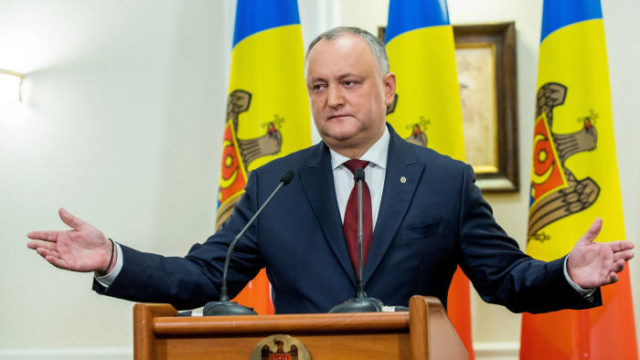
Igor Dodon, Moldova’s Strawman Dictator (Part One)
Publication: Eurasia Daily Monitor Volume: 17 Issue: 96
By:

Moldova’s russophile head of state, Igor Dodon, has been driven onto the defensive, along with his Socialist Party and the Socialist-led government, by their political opponents on several fronts. Opposition forces, acting separately for the time being and from different motivations (pro-Western, “oligarchic,” pro-Romania) seek to remove Dodon and his government from office before presidential and parliamentary elections are held.
Under such pressure, Dodon comes across increasingly as a weak and blundering president and even a soft target. He is accused of harboring ambitions for authoritarian rule ahead of the November elections, but he, in fact, lacks the institutional and personal wherewithal to pursue such ambitions. Dodon does not display the characteristics of an authoritarian personality, let alone a charismatic one. And he is a poor public communicator, prone even to self-inflicted damage in that capacity (see below).
Dodon has experienced a series of abrupt changes to his political situation and public image in the last 12 months or so, each phase illustrating the vulnerability and even precarity of his position. The now-unfolding phase is the fourth in this one-year period.
Until June 2019, Dodon was an intimidated and subservient partner to Moldova’s de facto ruler, Vladimir Plahotniuc. It was Plahotniuc who lifted Dodon into the presidency, only to deprive Dodon of even his limited presidential powers by politicized court verdicts in breach of the constitution.
The June 2019 regime change, jointly accomplished by Dodon’s Socialists and the pro-Western ACUM (“NOW”) bloc, resulted in a power-sharing deal, disproportionately in ACUM’s favor. This gave Moldova its best-educated, most competent-ever government under ACUM’s Maia Sandu, as well as the most broadly representative parliamentary coalition; and it allowed Dodon to move from pro-Russia positions toward national consensus-building, as he briefly did. Dodon can be said to have “never had it so good” for his own and the country’s future, but he failed to grasp the moment (see EDM, July 18, August 7, 8, 2019).
That alliance collapsed in November 2019, with both sides at fault, and both aiming to contest the presidency in the November 2020 elections. Dodon reverted from consensus-building to his aggressive russophile discourse, inspiring fears that he could turn from a weak and constrained president into an authoritarian one and move Moldova closer to Russia, if reelected this coming November (see EDM, November 13, 14, 2019 and February 13, 2020).
From February 2020 to date, “oligarchic” forces led by Plahotniuc’s godson Andrian Candu and Plahotniuc’s fellow-fugitive billionaire Ilan Shor are increasingly destabilizing Dodon’s presidency and the Socialist-led coalition government. The ACUM parties (weaker now in the opposition than they were while in government) are also conducting their own, equally implacable anti-Dodon campaigns, Dodon and his Socialist Party are responding indecisively and erratically. The president belatedly seeks a rapprochement with the staunchly anti-“oligarchic” ACUM parties, but his proposals look improvised and nervous. Moreover, Dodon’s avid courtship of Moscow renders him unacceptable even for a situation-dictated rapprochement with ACUM.
Dodon’s image as a would-be authoritarian ruler is mainly traceable to his various political competitors. This perception seems to bring together several overestimations: of Dodon’s political base and his available instruments, of his personal abilities and those of his staff, and of Russia’s objectives in Moldova and investment in Dodon. These factors are not only overestimated but also not in alignment with each other; and the countervailing forces are more than a match to any would-be authoritarian presidency in Moldova (though not to Plahotniuc-style informal or pseudo-coalition rule).
President Dodon is actually a beleaguered president. Like some of his predecessors, he muses aloud occasionally about turning Moldova into a presidential republic. He knows that most voters approve of this idea. Nevertheless, Dodon has quietly spent two and a half years at the end of Plahotniuc’s tight leash of a pseudo-parliamentary republic; and while the Socialist Party can attain a plurality again in the next parliament, that will not be anything near a constitutional majority.
Dodon’s direct influence over state institutions is limited and has even receded following the government’s reshuffle in March, when Dodon’s team yielded five ministries to the Democrat Party. That move sought to cement the Democrats’ loyalty to the parliamentary coalition with the Socialists. Meanwhile, however, “oligarchic” raiding has reduced the Democrat Party to a minor rump, and its shrinkage has reduced the Socialist-Democrat majority coalition to a minority in parliament. The “oligarchs’ ” successful, manipulative re-entry into Moldova‘s political system confirms the weakness of state institutions under Dodon’s presidency. And the current pandemic situation has further reduced the government’s effectiveness as a political instrument for any incumbent power holders.
The Socialist Party has built a media holding of its own in the last two years or so. This is probably the party’s most significant recent gain in terms of electoral assets. Plahotniuc’s camp, however, retains parts of its former media holding, while the ACUM bloc labors at great disadvantage in this regard. On the other hand, Dodon himself is a poor communicator. Some of his media appearances, including his weekly feature, “The President Responds,” unwittingly convey at times personal anxiety, insecurity and shifting messages. For example, he alternates appeals to cooperation with personal insults when asking the ACUM bloc’s leaders to join forces with him against the “oligarchs.”



